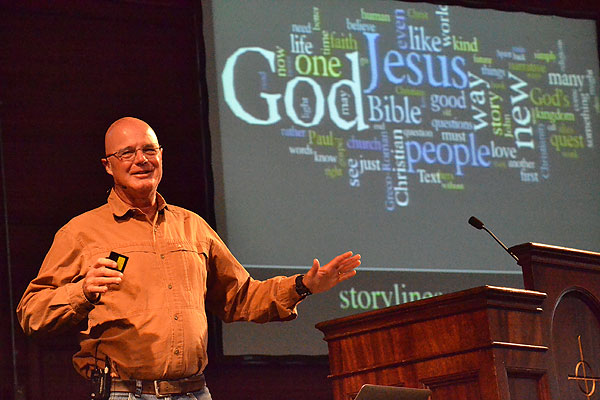
Brian McLaren speaks at NOAC 2015
“I can tell you love each other,” Brian McLaren said to the NOAC congregation as he began his morning keynote address. McLaren is a popular author, speaker, activist, and public theologian. His two most recent books are “Why Did Jesus, Moses, the Buddha, and Mohammed Cross the Road? Christian Identity in a Multi-Faith World” and “We Make the Road By Walking.”
For most American Christians, getting back to the Bible means a “backwards” view of the text, McLaren told the NOAC audience. Usually we transmit and interpret the Bible via all the theologians and scholars and church leaders who have left their marks on the history of the faith, as well as the popular writers who dominate Christian bookstores today. The problem, he said, is that means most of us try to squeeze scripture into a matrix that is human-devised rather than biblical.
Instead, McLaren suggested that the best way to go forward in faith as a Christian is to work at getting back to the Bible’s original understanding, not the one we have developed over the centuries since.
That does not mean McLaren ignores the rich history of landmark theologians. During the course of his talke he quoted Martin Luther, as well as Father Vincent and Vaclav Havel and many others who have provided biblical interpretations. But he centered his attention on the core narrative of the Bible found in Exodus, Genesis, and Isaiah, which is about God’s history, not ours.
McLaren repeatedly displayed a graph that he had developed earlier in his ministry, when he tried to squeeze every Bible narrative, as well as other historical narratives, into the same flow chart. In this chart, the path from Eden to Heaven is sideswiped by the Fall, where a choice is made to accept the offer of salvation leading back to heaven, or the choice of denial that leads to Hell. This is the narrative flow of the typical American Christian understanding, he said.
By contrast, the core biblical storyline is in three parts: the central narrative of Exodus, a story of liberation and formation; the “prequel” in Genesis, which is about Creation and reconciliation; and the “sequel” in Isaiah, about how to seek a peaceable kingdom of justice and mercy.
“This is not an elevator theology,” McLaren said. “This is an incarnational theology,” based on the interaction between real people and God, and people with each other.
Christians, he said, “should learn and tell a better story of justice, peace, and joy,” and not parrot flawed and outdated storylines. God’s people are called to tell an alternate story that can be shared in common with all people. “Link your story with God’s story.”